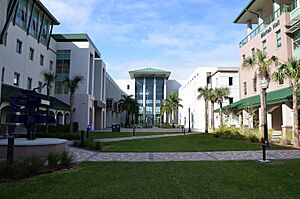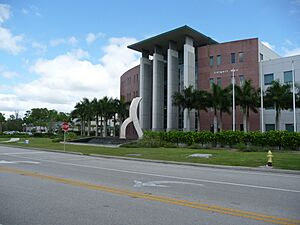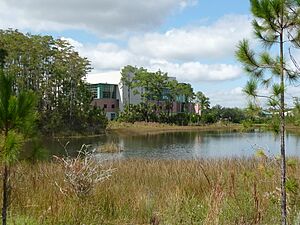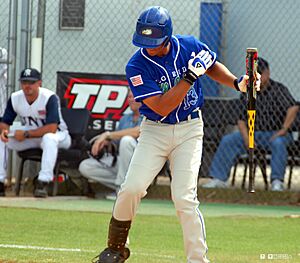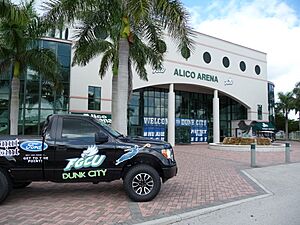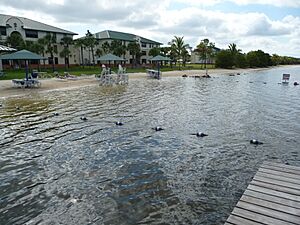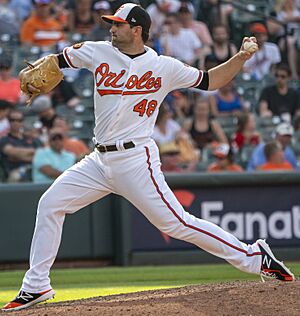Florida Gulf Coast University facts for kids
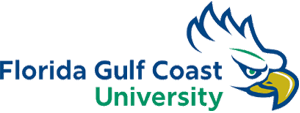 |
|
|
Other name
|
FGCU |
|---|---|
| Motto | "Truth, Knowledge, Wisdom" |
| Type | Public university |
| Established | May 3, 1991 |
|
Parent institution
|
State University System of Florida |
| Accreditation | SACS |
|
Academic affiliation
|
|
| Endowment | $129.3 million (2022) |
| Chairman | Blake Gable |
| President | Aysegul Timur |
| Provost | Mark Rieger |
|
Academic staff
|
526 |
|
Administrative staff
|
875 |
| Students | 16,633 |
| Undergraduates | 11,444 |
| Location |
,
Florida
,
United States
|
| Campus | Large suburb, 800 acres (320 ha) |
| Media | Eagle Media |
| Colors | Cobalt blue and emerald green |
| Nickname | Eagles |
|
Sporting affiliations
|
|
| Mascot | Azul the Eagle |
| Lua error in Module:Location_map at line 420: attempt to index field 'wikibase' (a nil value). | |
Florida Gulf Coast University (FGCU) is a public university in Lee County, Florida, United States. It is located near Fort Myers. FGCU is part of the State University System of Florida. It was started on May 3, 1991. The university offers many different study programs. These include bachelor's, master's, and doctoral degrees.
FGCU's sports teams are called the Eagles. They play in NCAA Division I sports. The Eagles are part of the Atlantic Sun Conference (ASUN).
Contents
University History
How FGCU Started
In 1991, a person named Charles B. Edwards helped make a law. This law suggested that Florida's 10th state university should be built in Southwest Florida. Florida's governor, Lawton Chiles, signed the bill in May 1991.
The university was built on a large piece of land. This land was about 760 acres. It was given by Ben Hill Griffin III. On April 26, 1993, Roy E. McTarnaghan became the first president. He and a small team worked from a temporary office. Classes officially began on campus on August 25, 1997. One of the main buildings, Academic Building 5, was later named Charles B. Edwards Hall. This was done to honor Edwards.
Growing Bigger
In July 1999, William C. Merwin became FGCU's second president. He worked hard to make the university grow. Merwin raised over $250 million for the school. This helped build many new buildings. Some of these were the Lutgert College of Business and Alico Arena. The number of students also grew a lot. It went from about 2,000 students at first to almost 15,000 by 2017.
In 2007, Wilson G. Bradshaw became the third president. He stepped down after the 2016–17 school year. Michael V. Martin then became the new president on July 1, 2017. This change happened during the university's 20th anniversary.
FGCU started a program called "Soar in 4" in 2016. This program helps students graduate in four years. If they meet certain rules, they can get money back for their first year of tuition.
In 2017, the College of Health Professions & Social Work got a new name. It became the Marieb College of Health & Human Services. This was after a $10 million gift from a donor named Elaine Nicpon Marieb.
In June 2023, Aysegul Timur was chosen as FGCU's fifth president. She is the first woman to be president of the university. Timur started her role on July 1, 2023.
Campus Life and Buildings
Main Campus Area
FGCU's main campus is about 807 acres. It is located in Lee County. The campus is about 21 miles from Naples. It is also south of Fort Myers.
The center of the campus is called the Academic Core. It is about 150 acres. Most classrooms and labs are in this area. There are three places where students can live on campus. These are North Lake, South Village, and West Lake Village. North Lake Village is next to Lake Como. Students can enjoy boating and water skiing there. A new boardwalk and dining place opened there in 2017.
New Buildings and Growth
Many new buildings have been added to FGCU. The Lutgert College of Business opened in 2008. Holmes Hall, which has the U.A. Whitaker School of Engineering, opened in 2009. Herbert J. Sugden Hall, home to the School of Resort & Hospitality Management, opened in 2008.
Academic Building 7 was finished in 2010. It was named Seidler Hall in 2016. Academic Building 8 was completed in 2012. It is now called Marieb Hall. This building was made for the College of Health Professions. It was renamed the Marieb College of Health & Human Services in 2017.
Other projects included making the Cohen Center (the student union) bigger. Alico Arena also got bigger in 2017. A large solar panel field was built. This field helps power some campus buildings. FGCU also opened the Emergent Technologies Institute in 2016.
FGCU created the Everglades Wetland Research Park (EWRP). It is located in Naples, Florida. This park helps with teaching and research about wetlands and rivers.
In 2019, FGCU started building the Water School. This building has labs and classrooms for water quality research. The Water School opened in November 2022. It is FGCU's largest academic building.
Other Campus Locations
FGCU has three other smaller campuses. These are in Naples, Fort Myers, and Punta Gorda. These locations offer classes for continuing education.
In 2007, the university bought a resort in Bonita Springs. It is now used as a marine research lab. This place is called the Norm and Nancy Vester Marine and Environmental Science Research Field Station. It has boat slips, labs, and offices.
Caring for the Environment
Since FGCU started, about 400 acres on the main campus have been set aside. This land is for protecting the environment. The university has also built lakes on campus. These lakes are home to many animals. They also help the local environment.
FGCU's main goal is to be environmentally friendly. Seidler Hall has achieved the highest level of green building certification. The university's 15-acre solar field provides about 85 percent of the energy for some buildings. This helps FGCU use less power from the main electric company. An ice thermal storage plant also helps cool campus buildings. This saves a lot of money. The newest student dorms use solar panels on their roofs to heat water.
University Library
The Library Complex is on FGCU's main campus. In the 2016–17 school year, it had over 1 million visitors. The library has more than 1.5 million items. Students and others with a library card can use them. It also has access to over 400 online databases. These give access to many articles. The east wing of the library has a large computer lab.
In 2023, the computer lab was updated. It now has new furniture and computers. The library also displays various art pieces. These include seven signed artworks by Salvador Dalí. The Archives and Special Collections unit on the third floor has held many exhibits. The Library Complex was named after Wilson G. Bradshaw in 2019.
What Students Learn
FGCU has eight main colleges where students can study. In 2024, new students had an average SAT score of 1122. Their average high school GPA was 4.12.
The Lutgert College of Business offers degrees in many areas. These include accounting, computer information systems, and finance. It also helps local businesses.
FGCU's School of Entrepreneurship is highly rated. It offers a degree in entrepreneurship studies. It also has programs like the FGCU Runway Program. This program helps students and alumni start their own businesses.
The Resort and Hospitality Management Department offers several majors. Students can get real-world experience at resorts. The professional golf management program is special. It is one of only 19 such programs in the country.
All FGCU students must take a course called University Colloquium: A Sustainable Future. This class teaches about protecting the environment. Students also have to do volunteer work. They have given over 5 million volunteer hours since the university opened.
FGCU's College of Engineering offers degrees in different types of engineering. These include civil, environmental, and software engineering. Holmes Hall was built for these programs. The engineering programs are approved by ABET.
In 2017, FGCU started an Honors College. It opened in August with almost 900 students.
Research at FGCU
In 2015–16, almost $10 million was given for research projects. FGCU has several research centers. These include the Coastal Watershed Institute and the Center for Environmental & Sustainability Education. Since FGCU opened, over $204.8 million has been given for research.
University Rankings
Florida Gulf Coast University is recognized in many rankings.
- In 2022-23, U.S. News & World Report ranked FGCU among the National Universities.
- For 2021, U.S. News & World Report ranked FGCU 68th in Regional Universities South. It was also named a top innovative school.
- In 2024, Washington Monthly ranked FGCU 123rd among national universities. This was based on how much FGCU helps the public.
- Forbes ranked FGCU 247th out of the top 500 colleges in America for 2024-25.
- In 2020, The Princeton Review ranked FGCU's entrepreneurship program as 30th best overall. It was first in Florida.
Sports at FGCU
FGCU's sports teams are called the Eagles. They became a full NCAA Division I school in 2011. The Eagles play in the Division I Atlantic Sun Conference (ASUN). They joined this conference in 2007.
FGCU offers many sports for men and women:
- Golf
- Tennis
- Basketball
- Softball
- Baseball
- Cross country
- Volleyball
- Soccer
- Swimming and diving
- Beach volleyball
FGCU plays basketball games at Alico Arena. Baseball games are played at Swanson Stadium. There are also fields and courts for other sports on campus. In spring 2017, the average GPA for a student athlete at FGCU was 3.27.
Baseball Team
The FGCU baseball team has sent several players to professional leagues. These include Major League Baseball pitchers Richard Bleier and Chris Sale. Both played for the Boston Red Sox. Casey Coleman was the first Eagle to play in the major leagues. Justin Stiver was the first Eagle athlete drafted by a professional team.
Basketball Team
On March 24, 2007, FGCU's women's basketball team had a great season. They finished 35–1. In 2008, the women's team played in the WNIT. They were the first team to do this in their first year of Division I sports. The women's team has won many championships since then.
In 2012, the men's team played in the Atlantic Sun Championship final. In 2013, the team won the Atlantic Sun championship. This earned them a spot in the 2013 NCAA Division I men's basketball tournament. In their first tournament, the Eagles surprised many. They beat Georgetown and San Diego State. The Eagles were the first No. 15 seed to reach the Sweet 16. They won two more ASUN championships in 2016 and 2017.
Student Life
Where Students Live
Students can live in three areas on campus. These are North Lake Village, South Village, and West Lake Village. North Lake Village has apartments by an 80-acre lake. West Lake Village was bought by the university in 2010. South Village (SoVi) has suite-style dorms. There are five buildings there.
In summer 2013, South Village opened the SoVi Pool. It is a resort-style pool. North Lake Village got a new boardwalk and dining area in 2017. More than 3,200 students live on campus. Freshmen do not have to live on campus. However, the housing is usually full every year.
Each dorm building has its own activities. Students can also join the Resident Hall Association. The Eagle Express is a shuttle bus on campus. It takes students from their dorms to classes.
Fraternities and Sororities
Florida Gulf Coast University has 24 fraternity and sorority chapters. These groups are managed by different councils. There are no separate houses for these groups on campus.
Campus Fun and Sports
The Campus Recreation department plans many trips. These include rock climbing, skydiving, and kayaking. There are also 32 official sports clubs on campus. Many of these clubs compete with other universities.
Student Groups
FGCU has over 165 registered student groups. The Student Government helps fund many of these groups.
University Media
The university runs public broadcasting stations. These are WGCU television and WGCU-FM radio. WGCU is a PBS member. WGCU-FM is an NPR member. It broadcasts news, talk, and jazz music. FGCU 360 Now is a website with university news. It goes along with the FGCU 360 Magazine.
Eagle Media is the university's student media group. It started in 1997 as "The Eagle" newspaper. Now, it publishes a weekly newspaper and a website. It also has TV and radio programs.
Notable Alumni
Many famous people have graduated from FGCU. Some of them are:
- Eli Abaev, a professional basketball player
- Richard Bleier, a professional baseball player
- Chris Sale, a professional baseball player
- Ross Chastain, a professional racecar driver
- Casey Coleman, a professional baseball player
- Kutter Crawford, a professional baseball player
- Dane Eagle, a member of the Florida House of Representatives
- Tiffany Esposito, a member of the Florida House of Representatives
- Brandon Goodwin, a professional basketball player
- Priscila Navarro, a concert pianist
See also
- Hertz Arena, a sports facility nearby. FGCU's ice hockey clubs play there.
- List of Florida Gulf Coast University people
 | Toni Morrison |
 | Barack Obama |
 | Martin Luther King Jr. |
 | Ralph Bunche |


